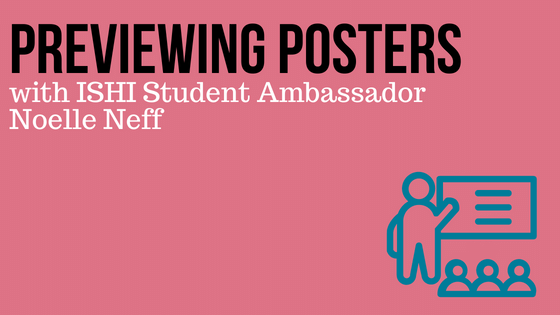Student Ambassador, Noelle Neff, will be presenting a project that sought to investigate if neurodegenerative disease can be revealed using a forensic DNA typing assay using next-generation sequencing (NGS) with her poster at ISHI 33 this month.
The forensic markers utilized for the identification of individuals were, in part, chosen because they are within noncoding regions of the genome. These noncoding regions were designed to be free of any additional information relating to an individual such as phenotypic and medical information. However, recent research has indicated that forensic STR markers, previously thought of as “junk” DNA, could potentially reveal private medical information.
The goal of this project was to investigate samples from individuals suffering from neurodegenerative disease acquired from Coriell Institute using the ForenSeqTM Signature Prep Kit to examine the possible association of the diseases to forensically relevant markers (e.g., STRs and SNPs). This study also aims to evaluate possible sex linkage, SNP linkage, how neurodegenerative samples compare to unaffected, “healthy” samples, and evaluate traditional capillary electrophoresis versus the NGS methodology.
We chatted with Noelle to learn a little more about her poster presentation. If you’ll be at ISHI 33 this year, be sure to stop by poster #24 to learn more!
Briefly describe your work/area of interest.
I am particularly interested in next generation sequencing (NGS). My project sought to investigate if neurodegenerative disease can be revealed using a forensic DNA typing assay using NGS. The forensic markers utilized for the identification of individuals were, in part, chosen because they are within non-coding regions of the genome. These non-coding regions were designed to be free of any additional information relating to an individual such as phenotypic and medical information. However, recent research has indicated that forensic markers (e.g., STRs and SNPs), previously thought of as “junk” DNA, could potentially reveal private medical information. Therefore, the goal of my project was to investigate DNA samples, acquired from Coriell Institute, from individuals diagnosed with specific neurodegenerative diseases using Verogen’s ForenSeqTM Signature Prep Kit and their MiSeq FGx NGS instrument to examine the possible association of the diseases to forensically relevant markers. The results of this project can be used to further demonstrate the possibility that certain forensic markers can be associated with additional information associated with an individual such as medical information. My mentor on this project was Dr. Kelly Elkins and other key collaborators included Dr. Cynthia Zeller. They co-direct the Towson University Human Remains Identification Laboratory (THRIL).
How did you get interested in this work? Why did this particular project appeal?
Next generation sequencing sparked my interest as I believe this methodology is the future of forensic DNA typing. This project developed when I took the advanced sequencing methods class that is offered as an elective course at Towson University. The class focused on the theory and application of DNA sequencing technology in which we specifically developed projects utilizing Verogen’s MiSeq FGx instrument and their ForenSeqTM Signature Prep Kit. My class project initially focused on two types of dementia. I then expanded the study for my graduate research project to include various neurodegenerative diseases such as Alzheimer’s disease, Parkinson’s disease, and ALS.
Can you summarize the impact of your work for the audience (ISHI attendees and some general forensic enthusiasts)? How might this advance the field?
Though capillary electrophoresis remains the traditional method utilized for DNA typing in forensic casework, the introduction of NGS has greatly impacted the forensic field. NGS-based methods have allowed for fast, high-throughput sequencing of STRs and additional genetic markers such as SNPs. Also, the limitations and drawbacks seen with the utilization of capillary electrophoresis can be avoided with the use of sequencing-based methods. NGS-based methods also provide a vast amount of additional information that could help with mixture deconvolution, assist with complex cases by providing an individual’s sequence variations, and assist with kinship scenarios.
My work investigates potential caveats of NGS for forensic DNA typing. This work further explores the possibility of forensic markers, found within non-coding regions of the genome, being linked to additional information relating to an individual such as phenotypic and medical information. It also explores the challenges faced with using NGS for forensic investigations such as ethical considerations that must be made with the use of this methodology.
WOULD YOU LIKE TO SEE MORE ARTICLES LIKE THIS? SUBSCRIBE TO THE ISHI BLOG BELOW!
SUBSCRIBE NOW!


